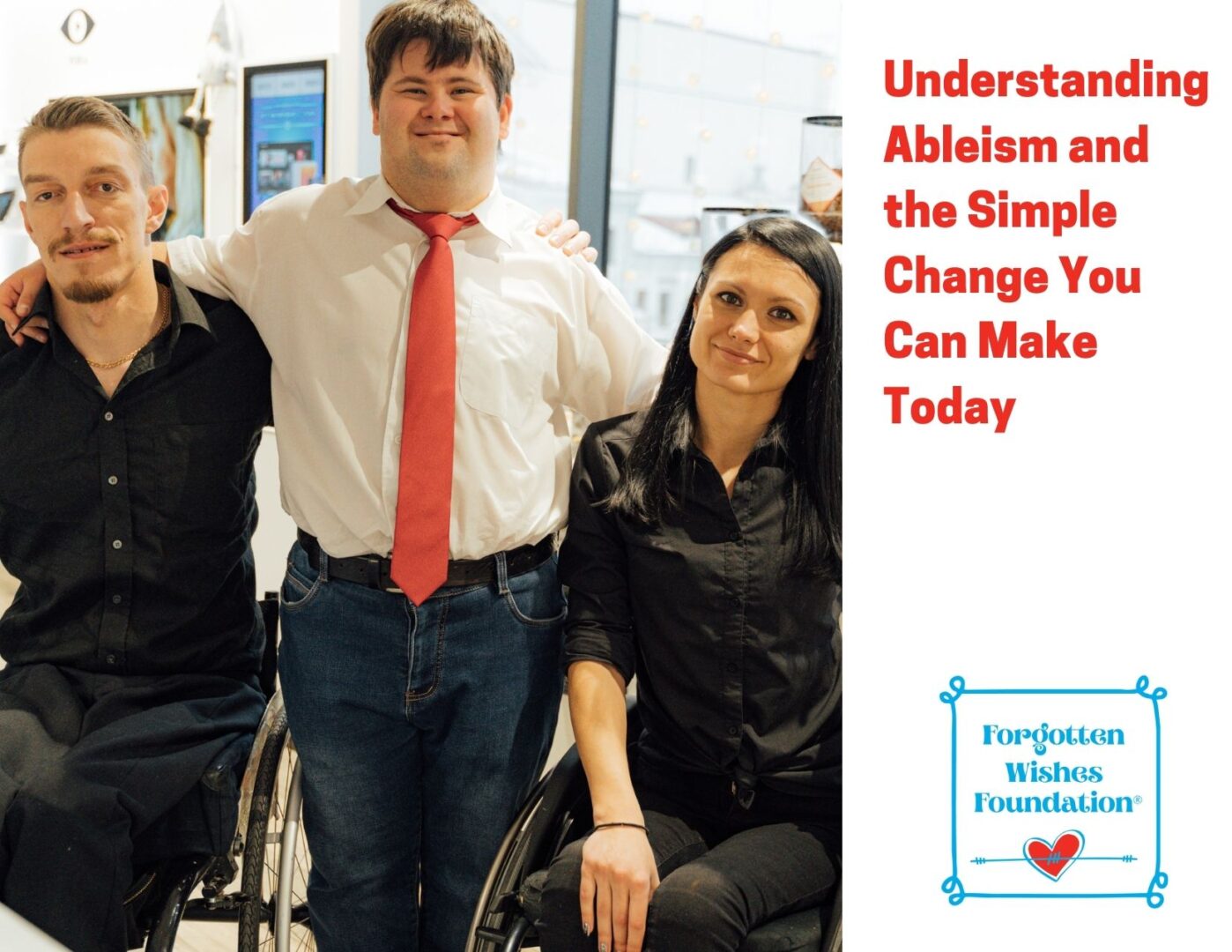
What is Ableism
The Forgotten Wishes Foundation believes that fostering an inclusive and empathetic environment for all individuals, regardless of their abilities, is crucial to our mission of creating a sense of belonging for people with disabilities. Unfortunately, ableism, a form of discrimination against people with disabilities, persists at all levels of our communities. The Forgotten Wishes Foundation aims to shed light on ableism, provide examples of ableist behaviors, comments, and actions, and offer alternative phrases to replace commonly used ableist language. Consequently, by challenging ableism, the Forgotten Wishes Foundation pushes for new norms and strives for a more inclusive and compassionate society.
Understanding Ableism
Ableism refers to the social prejudice and discrimination against individuals with disabilities, often stemming from deeply ingrained societal biases. Certainly, it perpetuates harmful stereotypes, exclusionary practices, and unequal treatment. Correspondingly, ableism can manifest overtly and subtly, often resulting in marginalization and limited opportunities for people with disabilities.

Common Ableist Behaviors and Actions
Pity and Infantilization: Treating individuals with disabilities as objects of pity or assuming they are childlike and incapable perpetuates ableist attitudes.
Ignoring Accommodations: Neglecting to provide necessary accommodations for individuals with disabilities, such as wheelchair ramps, closed captioning, or sign language interpreters, demonstrates a lack of inclusivity and accessibility.

Unwarranted Inspiration: Praising individuals with disabilities for their everyday actions, as if they are extraordinary solely because of their disability, reinforces ableist stereotypes. Appreciate their achievements without reducing them to their disabilities.
Language and Slurs: Using derogatory terms or slurs targeting people with disabilities perpetuates harmful stereotypes and devalues their worth. Using respectful language that acknowledges individuals’ abilities rather than focusing on limitations is important.

Tokenism: Tokenism occurs when individuals with disabilities are included only to create an appearance of diversity without genuine inclusion or meaningful participation. True inclusivity requires valuing diverse perspectives and fostering equal opportunities.
What Actions Can You Take
Presently, you can have a powerful impact by simply replacing ableist phrases with appropriate alternatives. Language plays an important role in shaping perceptions and attitudes. Therefore, we can promote inclusivity and respect by replacing ableist phrases with more appropriate alternatives.
Say This Instead of That to Combat Ablesim
- Instead of saying “wheelchair-bound” or “confined to a wheelchair,” say “uses a wheelchair” or “wheelchair user.”
- Replace “special needs” or “handicapped” with “individuals with disabilities.”
- Avoid using “retarded”, “spastic,” “moronic,” and other similar words. These terms once described specific disorders and are now used as slurs and derogatory descriptions. Replace them with appropriate adjectives to describe feelings, people, or situations.
- Instead of saying “suffering from” or “afflicted by,” use “living with” or “has a disability.”
- Replace ableist slurs with respectful and neutral terms when referring to people with disabilities. Use person-first language such as “person with an intellectual disability” or a “person with Autism.”
Ultimately, recognizing and challenging ableism is essential for creating a more inclusive and equitable society. Understanding the impact of ableist behaviors, comments, and actions can foster empathy and respect for individuals with disabilities creating a greater sense of belonging.

This article was written by Lisa Dempsey, Founder of the Forgotten Wishes Foundation.
